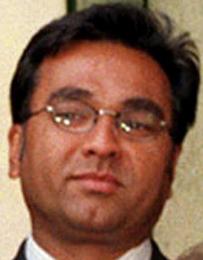| Serving
over 22 millions NRIs worldwide |
|
|
||
| Updated NRI Dr Patel's nomination has been rejected by the Lords Appointments Committee
London, March 21, 2007 NRI Dr. Chai Patel, who applied for Lord's Appointment has been rejected by the Lords Appointments Committee. His name was blocked in the "cash for peerages" because he he made a loan £1.5million to the party on the specific advice of Tony Blair's chief fundraiser, Lord Levy Chai Patel said that Lord Levy, appointed as fundraiser by the Prime Minister in 1994 and handed a peerage in 1997, told him that the party would prefer a loan to a donation. Dr Patel, whose nomination has been rejected by the Lords Appointments Committee, said that it was only later that he discovered the request was because commercial loans do not have to be disclosed. Dr Patel, founder of the Priory clinics, said that Lord Levy contacted him following the 2005 general election saying that Labour needed money to cover its campaign costs. He told the BBC: "At that meeting I agreed to a donation - £1.5 million. A few days later he phoned me to tell me that I could now donate the money as a loan rather than as a donation. "I was told that would be the preferred way to do it. And the reasons that have now been articulated... are that a loan is not disclosable." Dr Patel added: "You can see from today’s papers that actually if you donate money or loan money, when it comes out it brings a whole degree of innuendo, scrutiny, some suggestions that there may be other reasons and other motives for giving money. It is always attractive if you want to give not always to have that necessarily disclosed." He added: "I feel very hurt. Where I have arrived is somewhere I wanted to be, which is to serve in public life. I see the second chamber as a legislative chamber, as a very serious place to be an unelected legislature. "I believe I could have made a difference. I happen to voluntarily contribute some of the money I have towards a party I believe in. "Instead of having any acknowledgement for that, I have been dragged down into a two-dimensional person where I’ve somehow got money and I want to buy myself a bauble. That doesn’t seem like a fair way to be treated." Labour published last night a list of 11 other supporters who bankrolled the party’s election campaign with loans totalling almost £14 million. Among those named are a businessman who won more than £1 billion of government contracts and a venture capitalist whose company is under investigation by the Serious Fraud Office.
Dr Chai Patel CBE FRCP
Prior to forming Court Cavendish, Chai spent four years as an investment banker with Merrill Lynch and Lehman Brothers. He qualified as a Doctor from Southampton University in 1979. From 1997 to 2002, he was part of the Government’s Better Regulation Task Force leading on a number of Reports including those on Long Term Care, Early Years Education and Red Tape affecting Head Teachers. In 2000, the Health Secretary appointed Chai to the Modernisation Action Team drawing up a national plan for the new NHS. He was also part of the Task Force for Older People. Chai is very involved in healthcare policy issues, is a Trustee of the Institute for Public Policy Research (IPPR), a Senior Associate of the King’s Fund, a member of the NHS Confederation Affiliate Forum and a founder member of the New Health Network. He is also a Fellow of the Royal College of Physicians and the Royal Society of Arts, a member of the Institute of Directors, a Companion of the Institute of Management and has received an Honorary Doctorate from the Open University. In 1999 he was awarded a CBE for his services to the development of social care policies. Chai has been a Trustee of The Windsor Leadership
Trust since 2002. He feels the Trust is a unique organisation, bringing
together leaders from all walks of life and at all different stages
of leadership. It provides a powerful means of learning through
structured work, interaction and reflection. Dr Patel has spoken
at a Consultation for Newly Appointed Strategic Leaders and has
participated in several Strategic Leadership Consultations.
|
||
| |
|
Dr. Chaitanya Patel CBE FRCP (born September 14, 1954) is a British doctor and businessman is the former Chief Executive of the Priory Healthcare group. Born in Uganda to Indian parents, he obtained medical qualifications at the University of Southampton in 1979 and previously worked in the NHS. The Peerage The Peerage is the collective of all the Lords of the Kingdom or persons raised in class to be considered "Peers of the Monarch". Lords Spiritual, Dukes, Marquesses, Earls, Viscounts, Barons, Scottish Lords, and Life Barons are all part of the Peerage. Until recently, the Peerage could be easily defined as those who held a seat in the House of Lords (part of the Parliamentary system in Britain). Today, that is not the case as most of the hereditary Peers have been removed from the House under recent reform The Peerage is a system of titles of nobility in the United Kingdom, part of the British honours system. The term is used both collectively to refer to the entire body of titles, and individually to refer to a specific title. All British honours, including peerage dignities, spring from the Sovereign, who is considered the fount of honour
|

